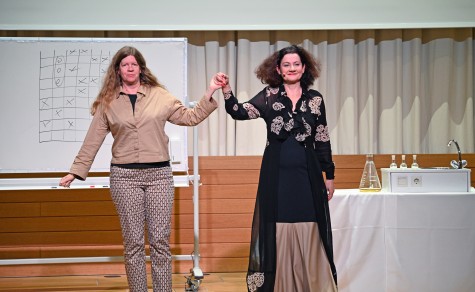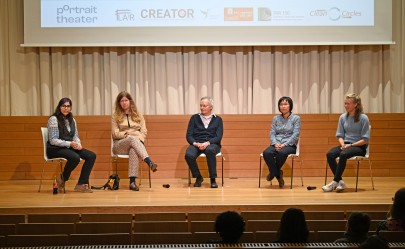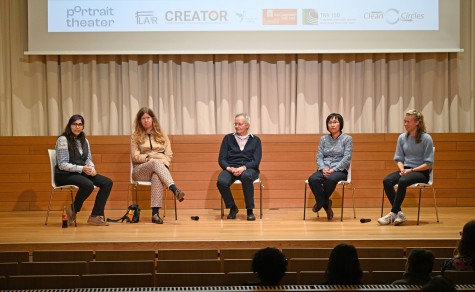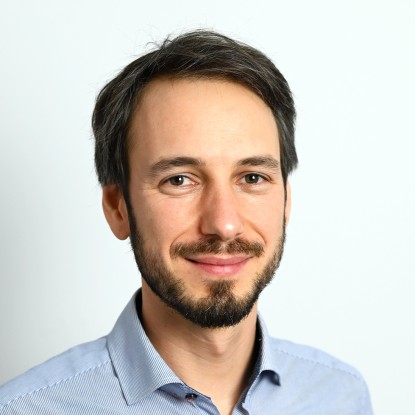Gender equality over time: from lab to stage
Collaborative research centres organise joint gender equality event
2024/11/07
What was life like for the three outstanding female researchers Marie Curie, Lise Meitner and Hedy Lamarr in a male-dominated world at the end of the 19th and beginning of the 20th century? What open rejection and doubt did they face and how did they manage to stand up to it? Answers were provided by a play performed on 30 October 2024 at the Technical University of Darmstadt.
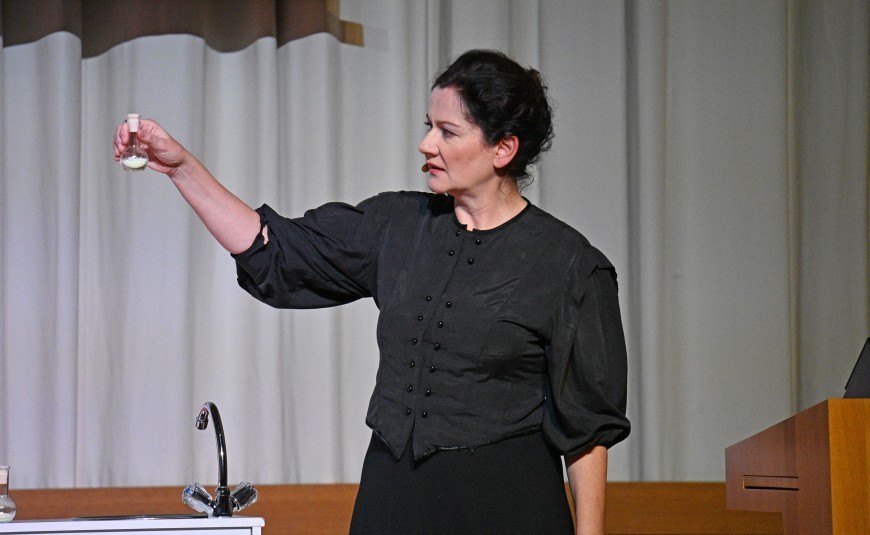
Radiation, nuclear fission and frequency hopping. Three pioneers are presented in the play as examples of the achievements of women in the fields of technology and science: Marie Skłodowska Curie (1867-1934), a two-time Nobel Prize winner and discoverer of radioactivity, the Austrian nuclear physicist Lise Meitner (1878-1968) and the Austrian-born Hollywood actress Hedy Lamarr (1914-2000) with the development of the frequency-hopping method. As different as their life choices were, their biographies reveal unexpected parallels. In the production “Curie_Meitner_Lamarr_indivisible” by the Viennese group portraittheater, excerpts from their lives, successes and obstacles intertwine with the research content and passion for their work.
Around 100 guests accepted the invitation of the collaborative research projects Clean Circles, Transregio (TRR)150, Collaborative Research Center (SFB) 1548, TRR 270, SFB 1487 and TRR 361 to the Wilhelm-Köhler-Saal at the TU Darmstadt to see the English-language production of the play on October 30, 2024. In the 90-minute piece, actress Anita Zieher embodies the three characters under the direction of director and author Sandra Schüddekopf, convincingly portraying their scientific background, their similarities, but also the different personalities of the three women.
An unstoppable passion for technology and science
All three women shared the ambition to achieve great things. Unafraid of innovation and the technical and scientific world, they broke into a field that was usually closed to women at that time. With their passion for technology and science, they stood up to contemporary social norms. Despite the openly expressed rejection in an almost all-male world, the three women proved themselves and dealt with this rejection. That was an additional task “besides” the purely scientifically complex content, family commitments in the case of Marie Curie and Hedy Lamarr, and the political events of the time surrounding the two world wars. All three managed to convince the most outstanding researchers of their time of their abilities and to work with them. As a result, they have become role models for countless female scientists up to the present day.
Each of these three personalities can be briefly described with their own basic statement: in Marie Curie's case, it is not to be weighed down by anything or anyone, neither by people nor by events. Lise Meitner's motivation was her love of physics, which drove her forward again and again. Hedy Lamarr took it for granted that creative people always produce the unexpected – this also applied to herself: as an actress, she was considered an outsider in the technical world, but with her invention she became the founder of today's encryption technology.
Panel discussion with TU scientists
Tody, open hostility towards women in science and technology no longer exists, but have we really reached our goal? Which difficulties from back then are still with us today? After the screening, the director of the play, Sandra Schüddekopf, biology professor Felicitas Pfeifer, professor of materials science Bai-Xiang Xu and mechanical engineering doctoral candidate Antje Vahl discussed these questions, moderated by Dr Laura D'Angelo from the equal opportunities team of the Department of Electrical Engineering and Information Technology. The three TU members have in common that they are active in the natural and engineering sciences – albeit at different career levels: from the master's graduate to the young professor to the already emeritus. This allowed the perspectives from different career levels and different temporal developments to flow into the discussion.
Questions from the audience were also included. The discussion revealed that networks and personal recommendations or mentoring are still extremely important. The feeling of female scientists and engineers that they have to prove their competence particularly against the background of the measures against the underrepresentation of women and that they are subject to tougher scrutiny than their male colleagues was also mentioned.
The audience members were full of praise for the choice of format. And the three principles of Marie Curie, Lise Meitner and Hedy Lamarr are just as helpful today as they were then.
Participating research associations/cst/pb


